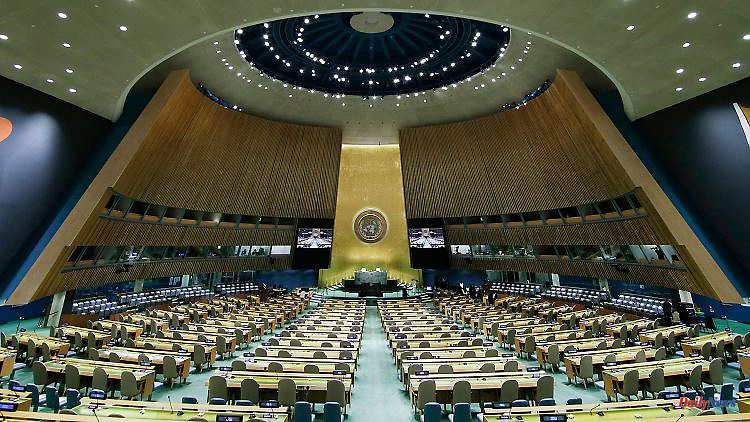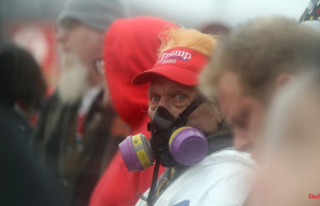The vote on the Ukraine war in the UN General Assembly is a global mood test - which Ukraine's supporters pass. Despite impressive support, important countries are abstaining.
On the anniversary of the Russian invasion of Ukraine, the world community has once again called on President Vladimir Putin to withdraw his troops by a large majority. 141 of the 193 member states in the UN General Assembly voted for a corresponding resolution. With Belarus, North Korea, Eritrea, Mali, Nicaragua and Syria, there were six countries that voted against the draft along with Moscow. As in previous votes, China and India, two powerful states and trading partners of Russia, abstained.
On the fringes of the General Assembly, Federal Foreign Minister Annalena Baerbock called on China to follow up on its announcements with action and to present a peace plan under the umbrella of the UN Charter. This is necessary because China, as a member of the UN Security Council, not only has veto rights, "but as a member has a special responsibility to restore world peace." Therefore, a real peace plan supported by China is necessary.
China's UN representative Dai Bing had previously announced a corresponding position paper from his government. He also criticized arms deliveries to Ukraine and a "Cold War mentality". Apparently directed towards Moscow, he stressed that the use of nuclear weapons would be unacceptable.
India and China, like Russia, belong to the BRICS countries, an association of emerging economies. Both countries are important trading partners for Moscow. None of the BRICS countries have so far participated in the western sanctions against Moscow, many see themselves in a dilemma and do not position themselves clearly against the Russian war of aggression in order to maintain trade relations with the West and Russia.
The vote in the United Nations' largest body is seen as a global mood test on Russia's war of aggression. The resolution in the UN General Assembly contains the demand for peace and Moscow's withdrawal. The draft reaffirms a number of previously agreed positions of the body and, among other things, provides for the preservation of Ukraine's territorial integrity. Kiev and its supporters thus followed up on similar voting results from last year with more than 140 "yes" votes. With the clear result, they want to counteract the impression that there is war weariness and crumbling support for Ukraine in parts of the world.
In March 2022, shortly after the war began, the Assembly had rejected Russia's invasion by a majority of 141 out of 193 votes. In October, 143 nations condemned Moscow's illegal annexations in Ukraine. The important countries Brazil, Turkey and Saudi Arabia voted in favor of the bill this time, while South Africa and Iran abstained. While almost all South American countries agreed, a number of African countries again abstained.
Before the vote, Baerbock had asked the world community to send a clear signal for an end to the war of aggression and to approve the resolution. "Today each of us has to make a choice: stand in isolation with the oppressor - or stand together for peace," she said. "If Russia stops fighting, this war will end. If Ukraine stops fighting, it will be the end of Ukraine." Baerbock delivered her speech at Ukraine's request as the last regular speaker before the vote.
In the past few days, the minister had campaigned for approval of the resolution, especially in countries of the so-called Global South - also on the fringes of the security conference in Munich last weekend. Most recently, she held talks with representatives from South Africa, India, Senegal, Ethiopia, Nigeria and Brazil. The Germans were particularly counting on the approval of the new government of Brazilian President Luiz Inácio Lula da Silva - the country is considered a key state of the Global South. The Brazilian government had been asked to submit text proposals - these then flowed into the work on the draft.
Behind the scenes at the UN, there had long been discussions about how substantial a resolution on the anniversary of the invasion could be. According to UN sources, Ukraine had been working on resolutions outlining a war crimes tribunal and text that would translate a ten-point peace plan by Ukrainian President Volodymyr Zelenskyy into a UN document. Both ideas were abandoned for Thursday's vote.
The text that has now been adopted contains rather vague formulations about the end of the war: it says that achieving a comprehensive peace, which is necessary, would "make a significant contribution to strengthening world peace and international security". It also calls for a full exchange of prisoners of war and stresses the need for those responsible for the most serious war crimes to be held accountable.
After twelve months of war, however, peace negotiations in the most serious military conflict on European soil since the Second World War seem a long way off: "In the past year we have not only seen suffering and devastation grow, it is also becoming increasingly clear how much worse everything could get." , UN Secretary-General António Guterres told the General Assembly. The danger of a continuing spiral of conflict is very concrete. "In the meantime we have heard implicit threats about the use of nuclear weapons," Guterres said. "The so-called tactical use of nuclear weapons is absolutely unacceptable."












